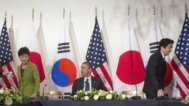Authors
Jiun Bang

Jiun Bang is a Ph.D. candidate in Political Science at the University of Southern California. From 2008-2010, she was an associate at the Korea Institute for Defense Analyses (KIDA), a government-affiliated research institute in Seoul. During that time, she was the assistant editor of The Korean Journal of Defense Analysis. Before joining KIDA, she worked on Middle East issues at a research institute located in Washington DC. She received her M.A. in Security Studies at Georgetown University, and her B.A. in international Relations from Ewha Womans University in Seoul, her hometown.
Articles by Jiun Bang

Japan - Korea
September — December 2016What Goes Up, Must Come Down
Going into the final months of 2016, Seoul-Tokyo relations had been on a positive trajectory, creating that ill feeling that it was time for things to go awry. While the relatively calm period witnessed palpable results with the signing of the General Security of Military Information Agreement (GSOMIA) and solidarity against North Korea’s provocations, the political chaos in South Korea that climaxed with the impeachment of President Park Geun-hye in December put the brakes on further developments. The scandals surrounding the abuse of power involving a shadowy confidante made it difficult to shake off the feeling that the administration’s deals with Japan have become tainted. Now, South Korean presidential hopefuls are tapping into public discontent to undermine the “comfort women” deal reached in December 2015, and there is high skepticism in the media over the implementation of GSOMIA.
The summer months were less tumultuous than usual for Seoul and Tokyo. Aside from the main political issue surrounding the implementation of the “comfort women” deal that was struck back in December 2015, there were many visible instances of cooperation across a range of sectors. To some extent, Seoul was preoccupied with the fallout from its decision to host the Terminal High Altitude Area Defense (THAAD) system while Japan was focused on its House of Councillors election in July. It was business as usual with North Korea for Japan, with efforts to denounce Pyongyang’s ballistic missile tests and the stalemate over the investigation into the abduction of Japanese citizens since the North’s decision to suspend the probe in February 2016.
Japan - Korea
January — April 2016Mostly Sanctions, Some Commerce, and Elections
The beginning of a new year offers an opportunity to evaluate how circumstances change. While the first few months of 2015 conveyed (cautious) optimism amidst notable celebrations like the anniversary of the restoration of diplomatic relations between Japan and South Korea and the 70th anniversary of the end of World War II, there was no focal point in early 2016 to push the momentum toward greater cooperation for Seoul and Tokyo. The main difference to the start of this year was the dominance of the Japan-North Korea dyad. Perhaps the Jan. 6 nuclear test by Pyongyang was a foreshadowing of things to come, as relations with Tokyo remained rather tumultuous: several missile tests by Pyongyang combined with retributive actions on the part of Tokyo made progress on the abduction issue – arguably Japan’s top priority vis-à-vis the North (alongside denuclearization) – extremely unlikely.
Japan - Korea
September — December 2015A Litigious Time of the Year
The overarching theme for the end of the year was litigation. The trial of Kato Tatsuya (former Seoul bureau chief for Sankei Shimbun) led to his acquittal for criminal libel. The trial of Park Yu-ha, a professor at Sejong University charged with defamation for her 2013 book Comfort Women of the Empire began in December. The General Association of Korean Residents in Japan (Chongryon) and its affiliates faced three separate lawsuits in Japan and South Korea. A Korean was arrested and later indicted for his role in placing a bomb at Yasukuni Shrine. There were also competing interpretations of the international status of North Korean refugees in the case of contingencies. The much-awaited November Park-Abe summit was quickly tested by incidents that could easily strain relations. To the credit of Seoul and Tokyo, neither government let a single issue damage the relationship. In fact, the two ended up reaching an accord on “comfort women/sex slaves” at yearend. Despite immediate praise from the US, there was considerable frustration from both publics over the agreement.
Japan - Korea
May — August 2015Sorry Seems the Hardest Word (unless you’re a CEO)
It has become the norm for countries to at least try to avoid undermining the spirit of bilateral celebrations. The general mood enveloping both Japan and Korea – in anticipation of the 50th anniversary of normalization of relations on June 22 – was to accentuate areas where progress was being made while marginalizing issues that are predictably controversial. This translated into some compromise on Japan’s pursuit of gaining inscription for several sites on UNESCO’s World Heritage List, a few exchanges of cultural artifacts, and bilateral talks and meetings on the sidelines of major international conferences. The general mood, however, was decidedly anticlimactic as the 70th anniversary of Korea’s independence from Japanese colonial rule or the defeat by Japan in World War II were not so much an occasion to celebrate how much each country had accomplished, but a reality check on how much the two had yet to achieve. This “glass half empty” sentiment prevented any one event to stand out as a hallmark of bilateral cooperation over the summer.
Japan - Korea
January — April 2015The Art of Politics and the Politics of Art
At the end of 2014, there were both stern warnings but also cautious optimism for what 2015 held in store for Japan and South Korea in anticipation of the 50th anniversary in June of the restoration of diplomatic relations and the upcoming 70th anniversary of the end of World War II. The early months of 2015 did not bring any new explosive point of contention to the surface, but issues such as talks on comfort women/sex slaves and territorial sovereignty over Dokdo/Takeshima remained the focus of relations. The most visible manifestation came with Prime Minister Abe’s visit to the US in late April. Clearly playing to his audience, he reassured Americans but disappointed Koreans. While governments were fine-tuning their art of politics, a group of nongovernmental actors – academics, large corporations, and the art community – got swept away by the politicization of bilateral relations.
Japan - Korea
September — December 2014How (Juicy) Tabloid News Subsumed Relations
Despite continued political bickering between Japan and its neighbors, Chinese and Korean tourism to Japan reached record heights in 2014. While the increase can be partly attributed to the plunging value of the yen, it also emphasizes one fact: the people of Northeast Asia are deeply interconnected in a number of ways. It is ironic that while both Japan and South Korea use the same characters and pronunciation for both “past” and “future,” there is little to suggest a consensus on either the past or the future. Nevertheless, the process of seeking some accord dominated the relationship in the final months of 2014 as evidenced by occasional meetings and brief encounters on the sidelines of multilateral conferences. To an optimist, there was no single dispute that consumed the bilateral relationship; to a cynic, there was no observable progress resulting from the meetings.
Japan - Korea
May — August 2014The Best of Times, the Worst of Times
Relations between Japan and the two Koreas were relatively calm. The most significant events centered on domestic issues with Japan’s reconsideration of the Kono Statement being the most notable. In all, relations remained frozen. In particular, ROK-Japan political relations remained “the worst of times.” But, so far these troubles have not had a significant impact on economic relations. Meanwhile, the DPRK and Japan have made tentative moves to repair relations, which could have major consequences for regional security if sustained. While “the best of times” is an exaggeration, it is worth noting that even though there is tension in East Asia, deadly conflict is relatively rare. Disputes between other countries remain confined to the rhetorical and diplomatic spheres, and economic cooperation continues to grow.
Japan - Korea
January — April 2014Is the US a “Wingman” or “Third Wheel”?
For the last few years, it has been popular for Japan-Korea watchers to ask about the possibility of a “reset” in their relations. The best time for this may be 2015, given that it marks the 70th anniversary of Korea’s liberation from Japan and the 50th anniversary of the Treaty on Basic Relations between Japan-Republic of Korea that normalized relations. As if to refute the idea that there might be any lull before a storm, Tokyo and Seoul rang in the New Year not with bells and whistles but a promotional video for Korea’s claim to Dokdo/Takeshima that went viral on YouTube. This may have set the tone for the months that followed. A major theme for the early months of 2014 was the role of the US – both as a setting and an actor – in issues ranging from the naming of the East Sea/Sea of Japan to getting the two heads of state in the same room.
Japan - Korea
September — December 2013More Naughty than Nice
The last four months of 2013 were uneventful for Korea-Japan relations. That is, simmering disputes continued to simmer and both sides made moves that annoyed the other, but there was almost no substantive action. Significantly, South Korean President Park Geun-hye continued to refuse to meet Japanese Prime Minister Abe Shinzo, and even some meetings between lower-level officials were called off. The biggest events were domestic issues that had implications for relations among the countries: the execution of Jang Song Thaek in North Korea and the release of the new National Security Strategy in Japan being the most notable. In all, relations remained frozen, with little evidence that 2014 would see any major changes in either attitudes or relations among Japan, South Korea, and North Korea.